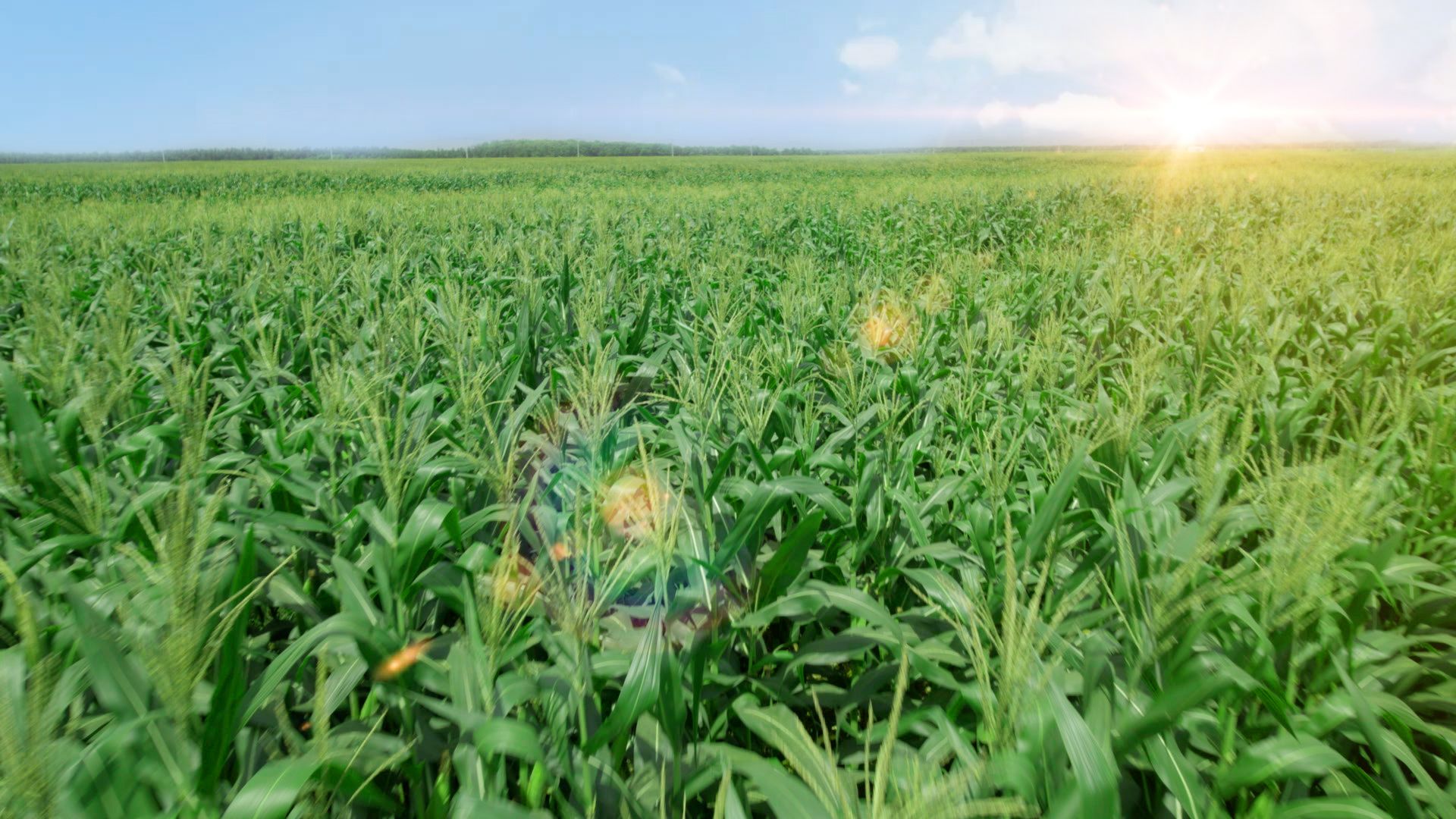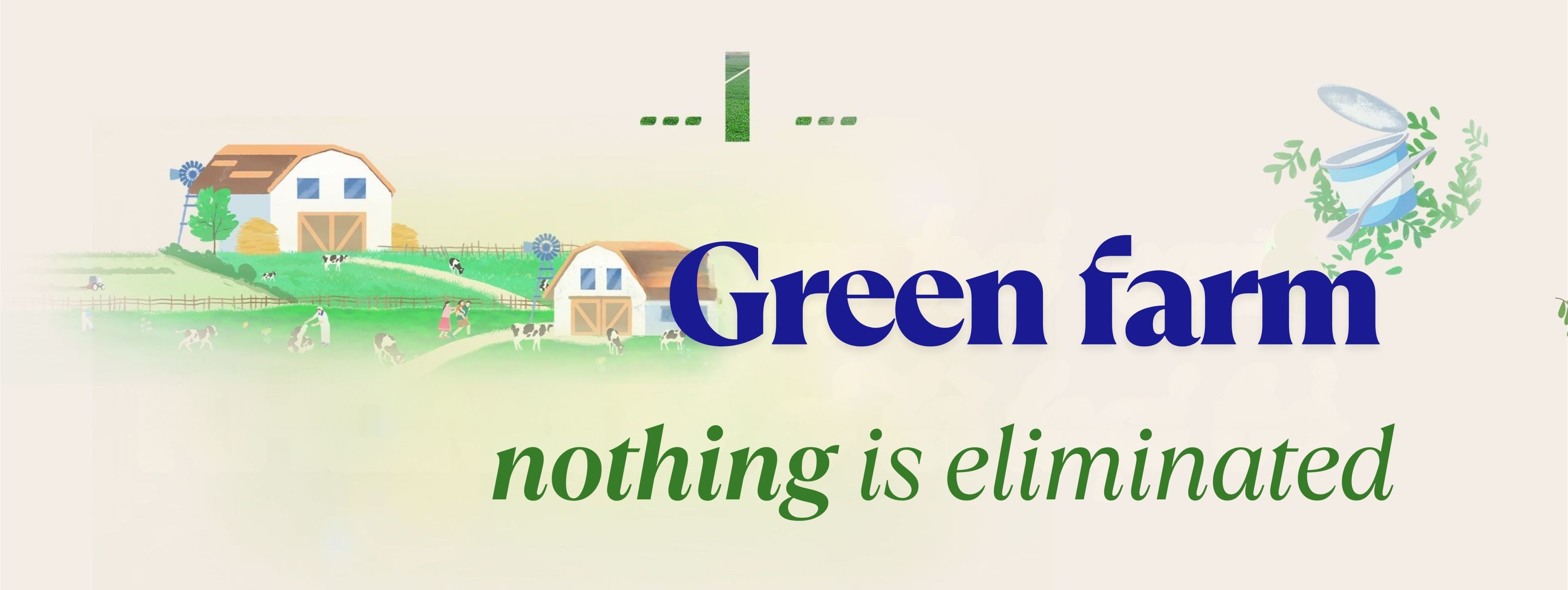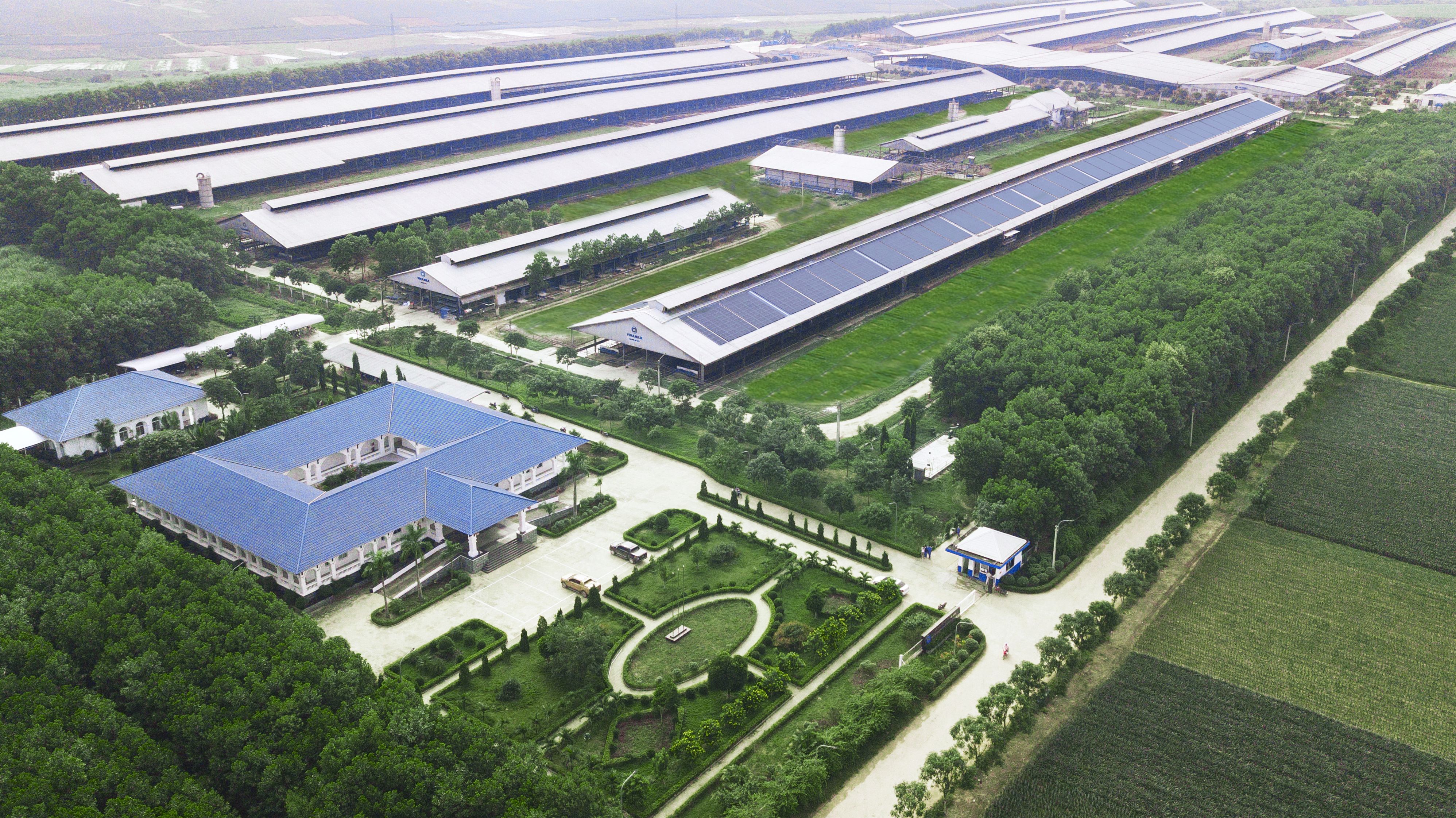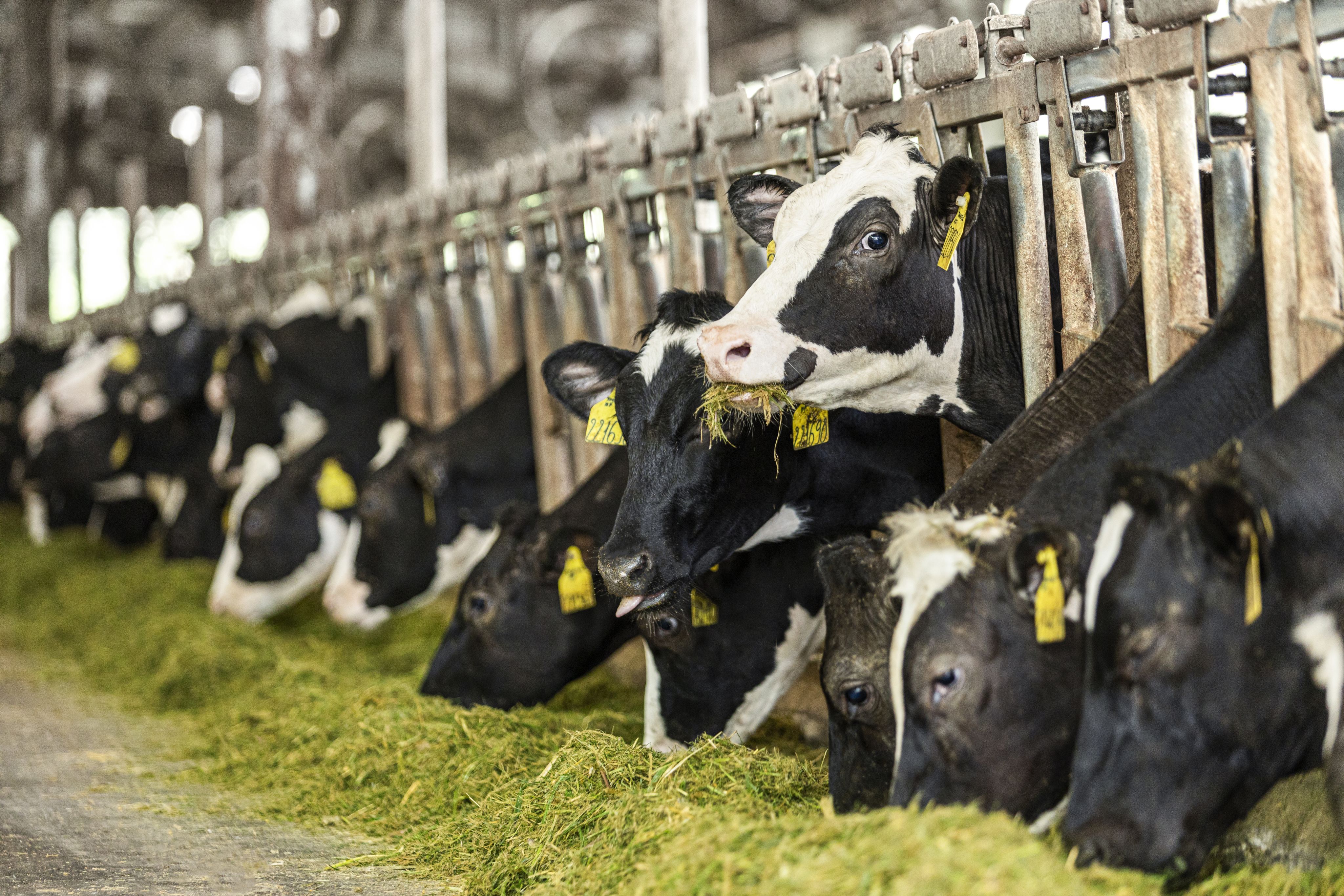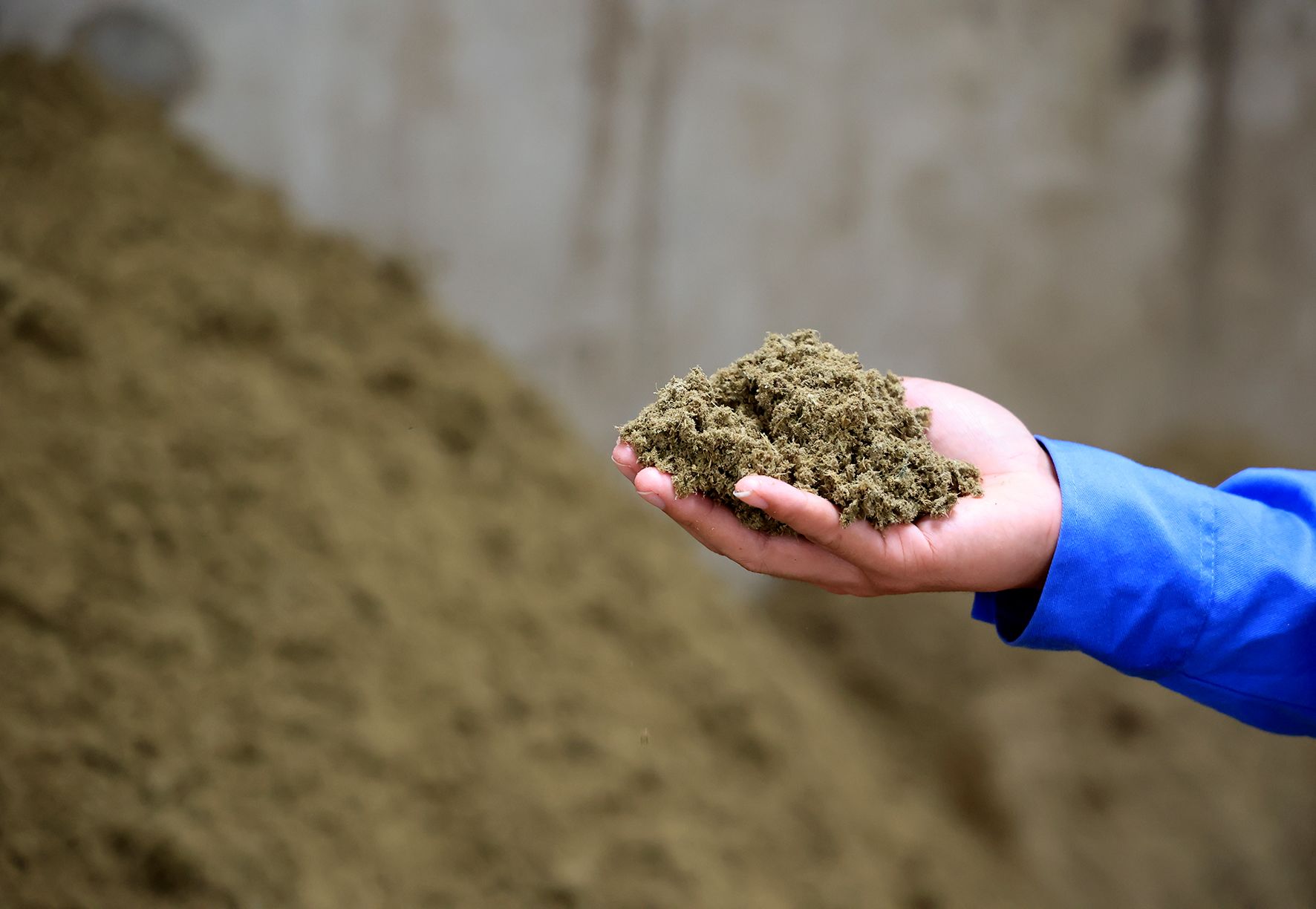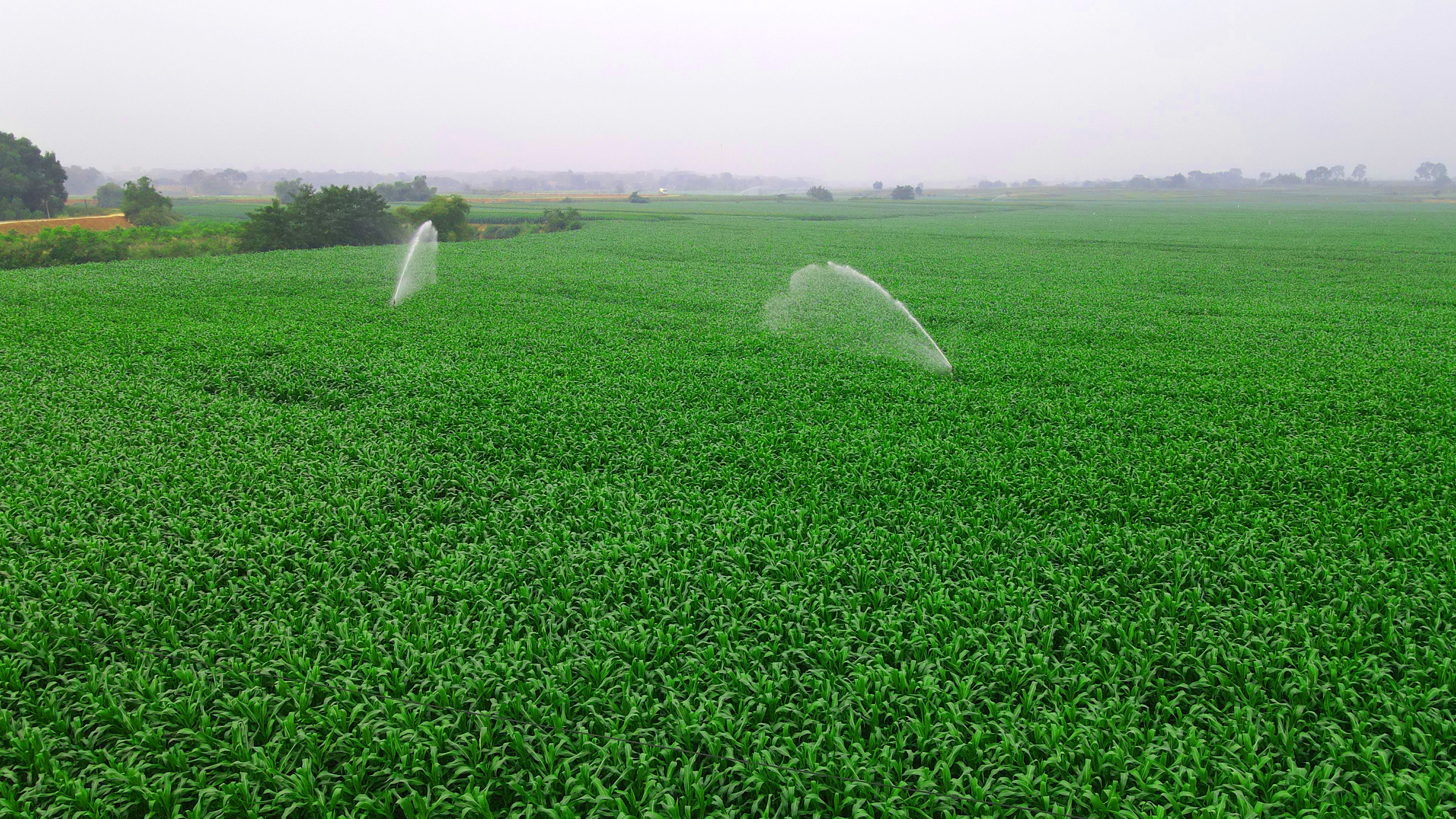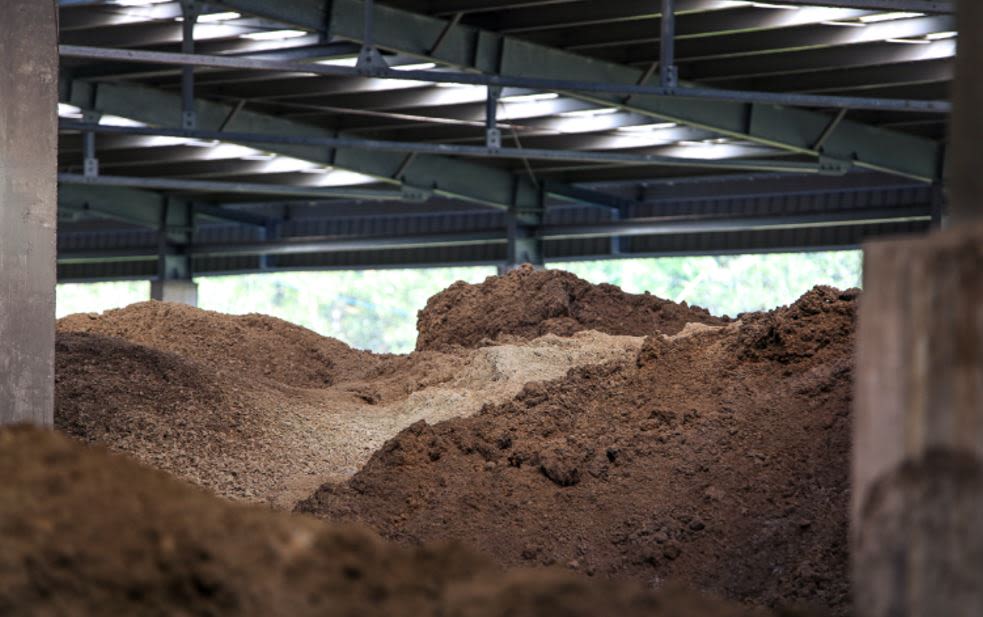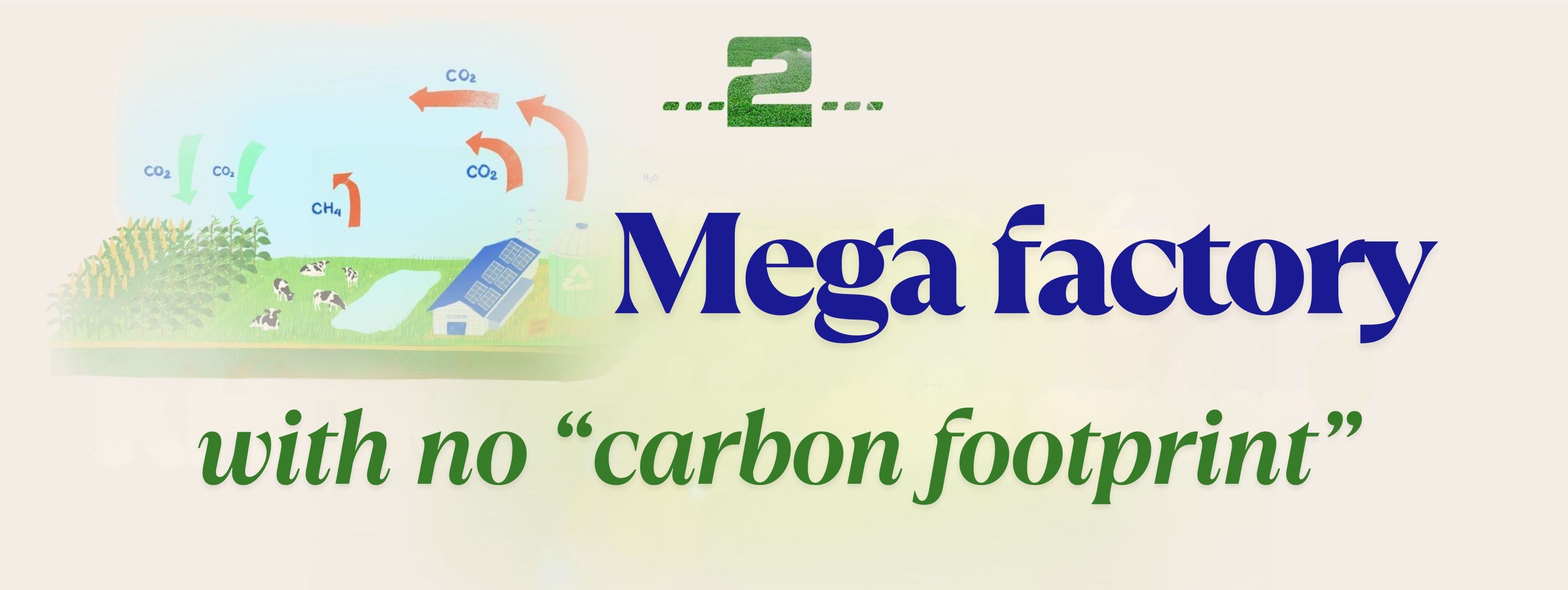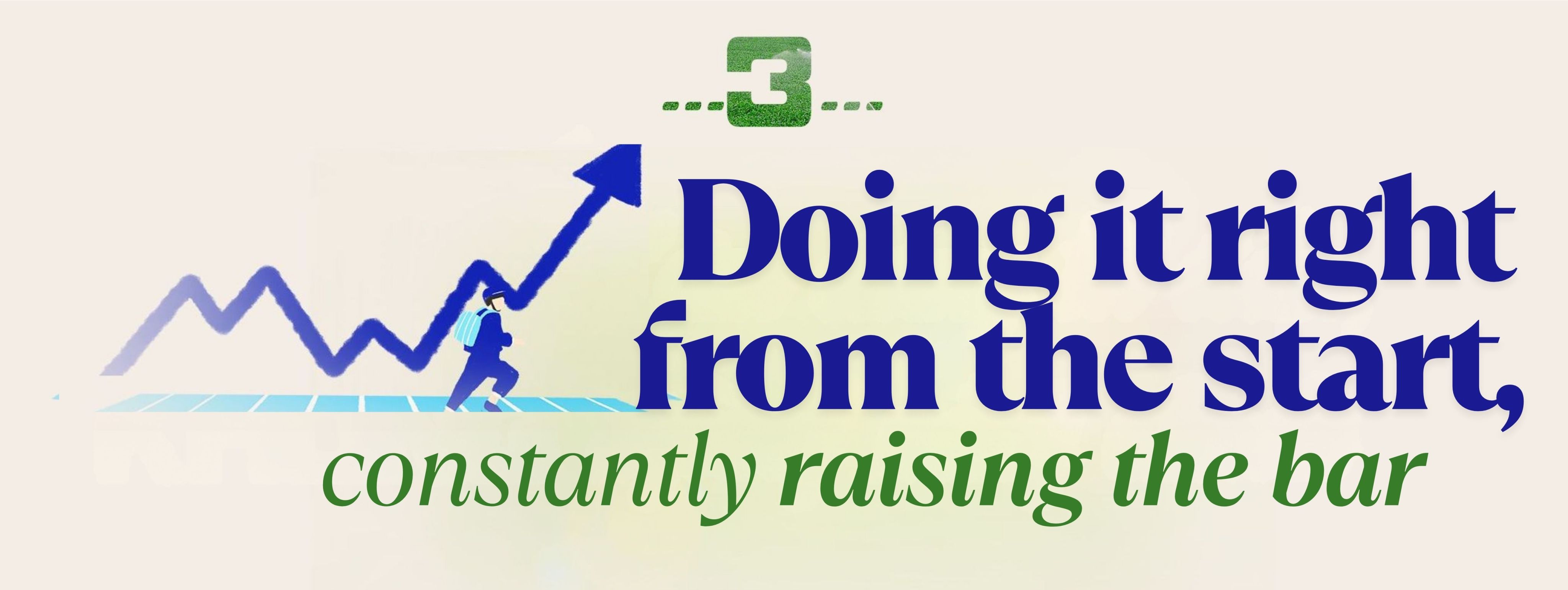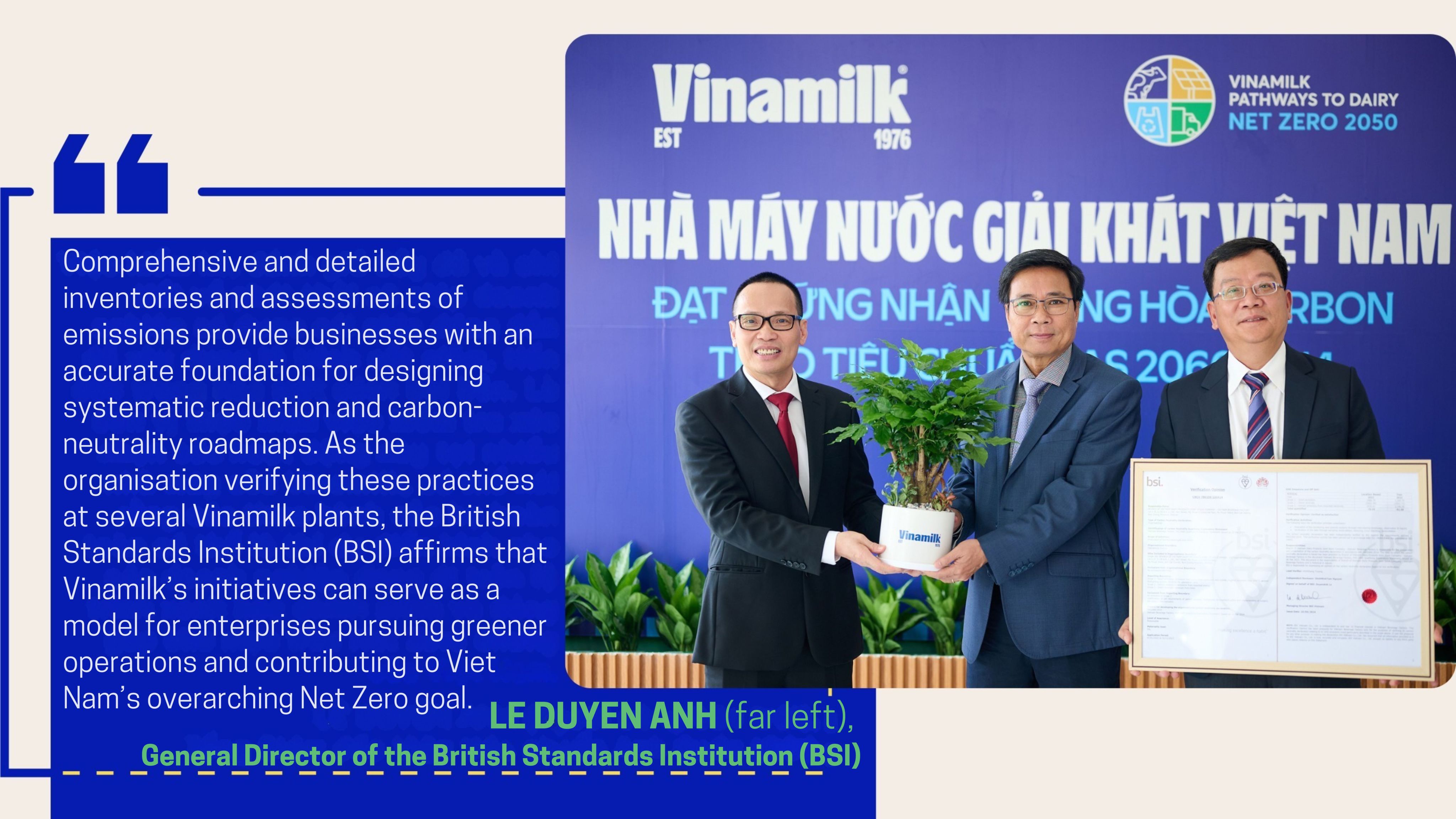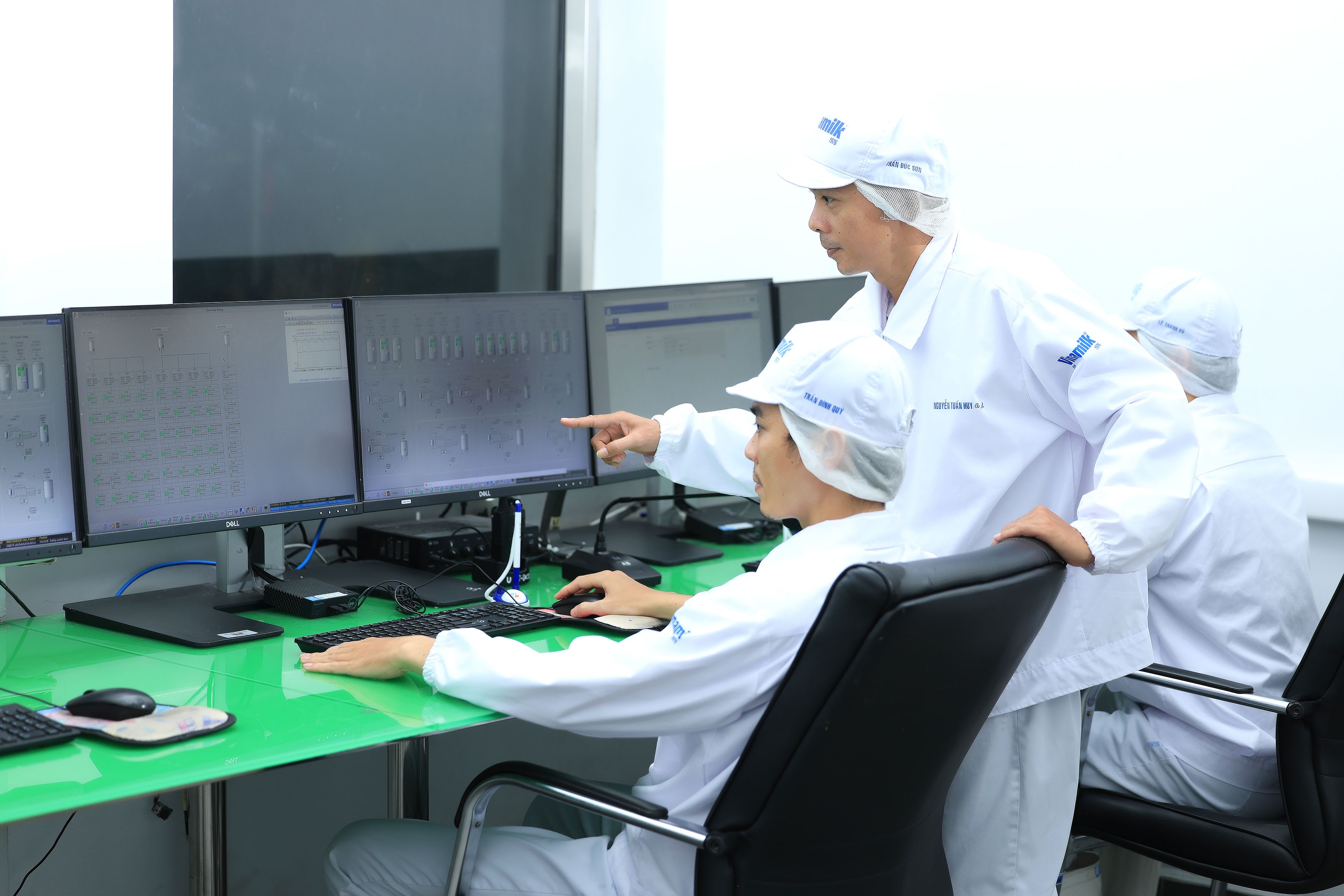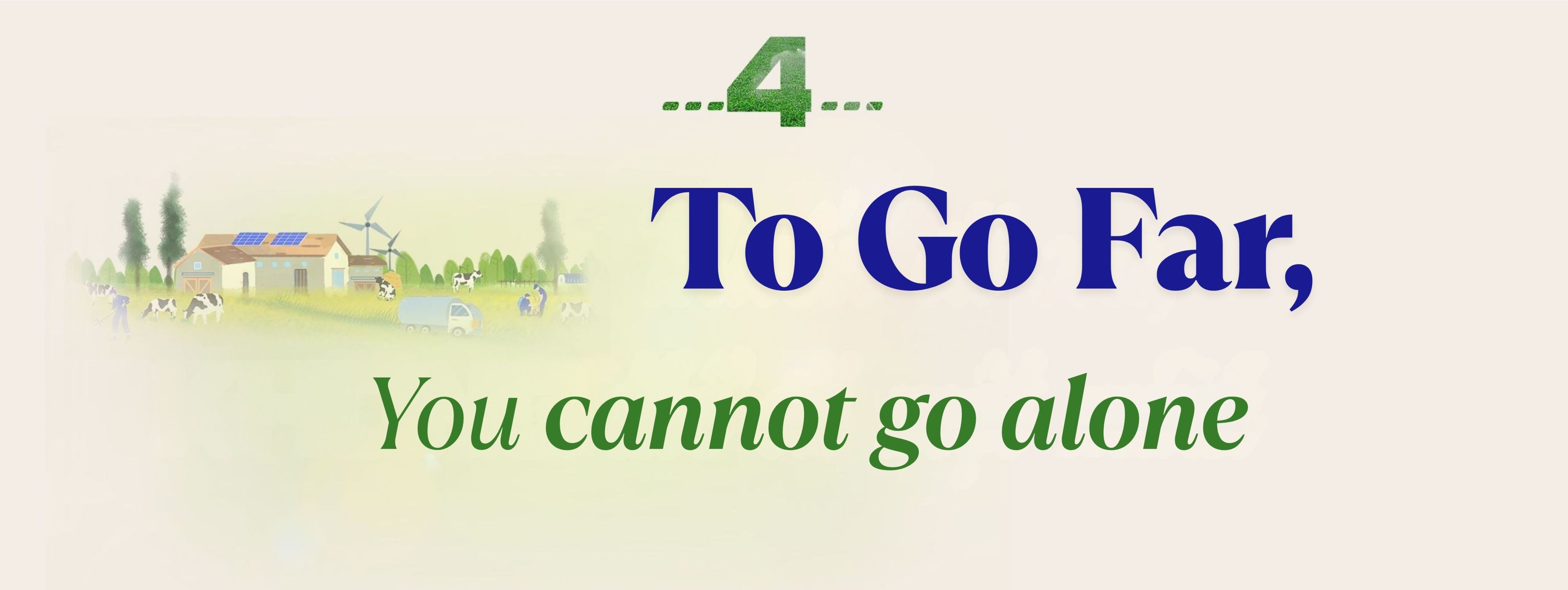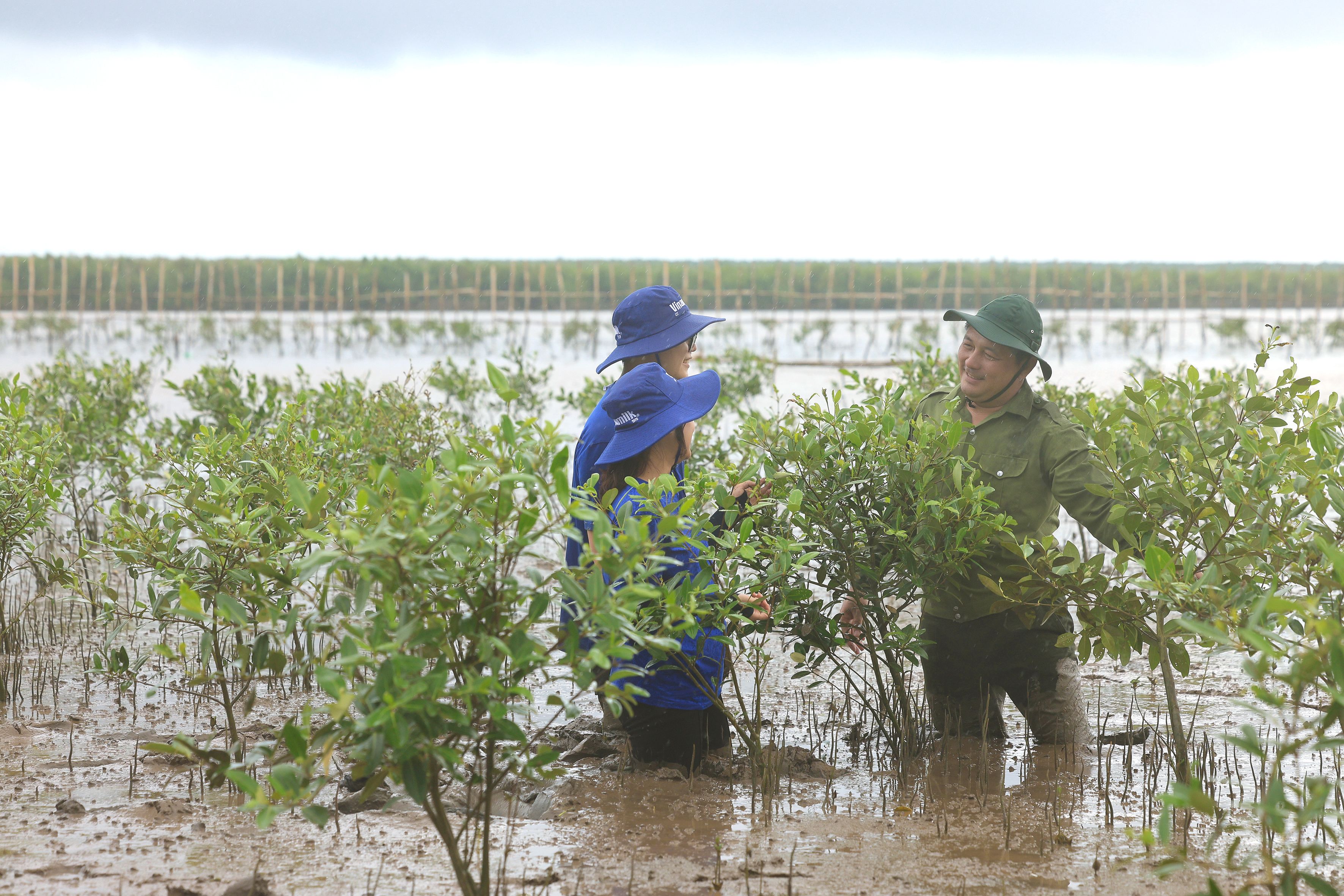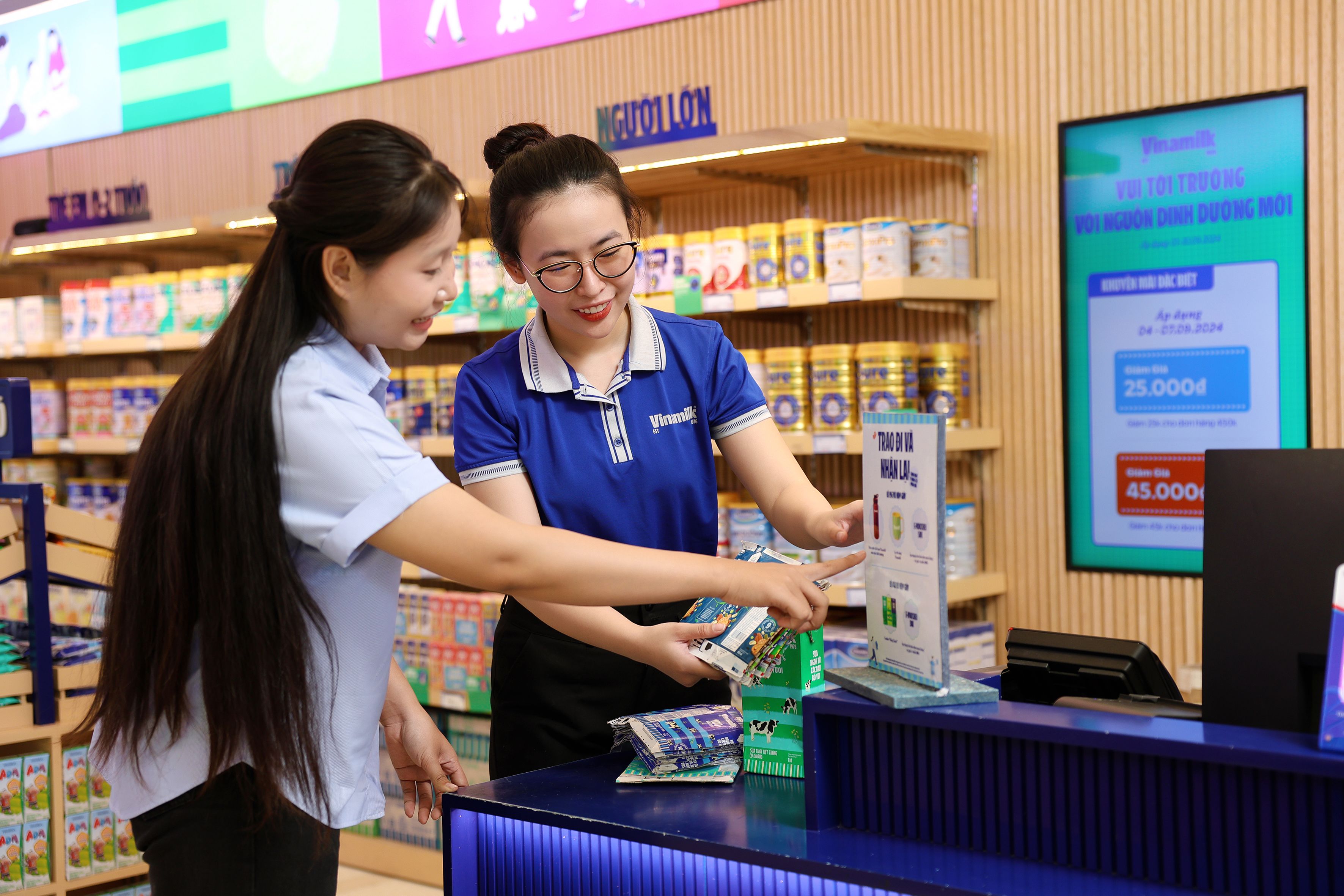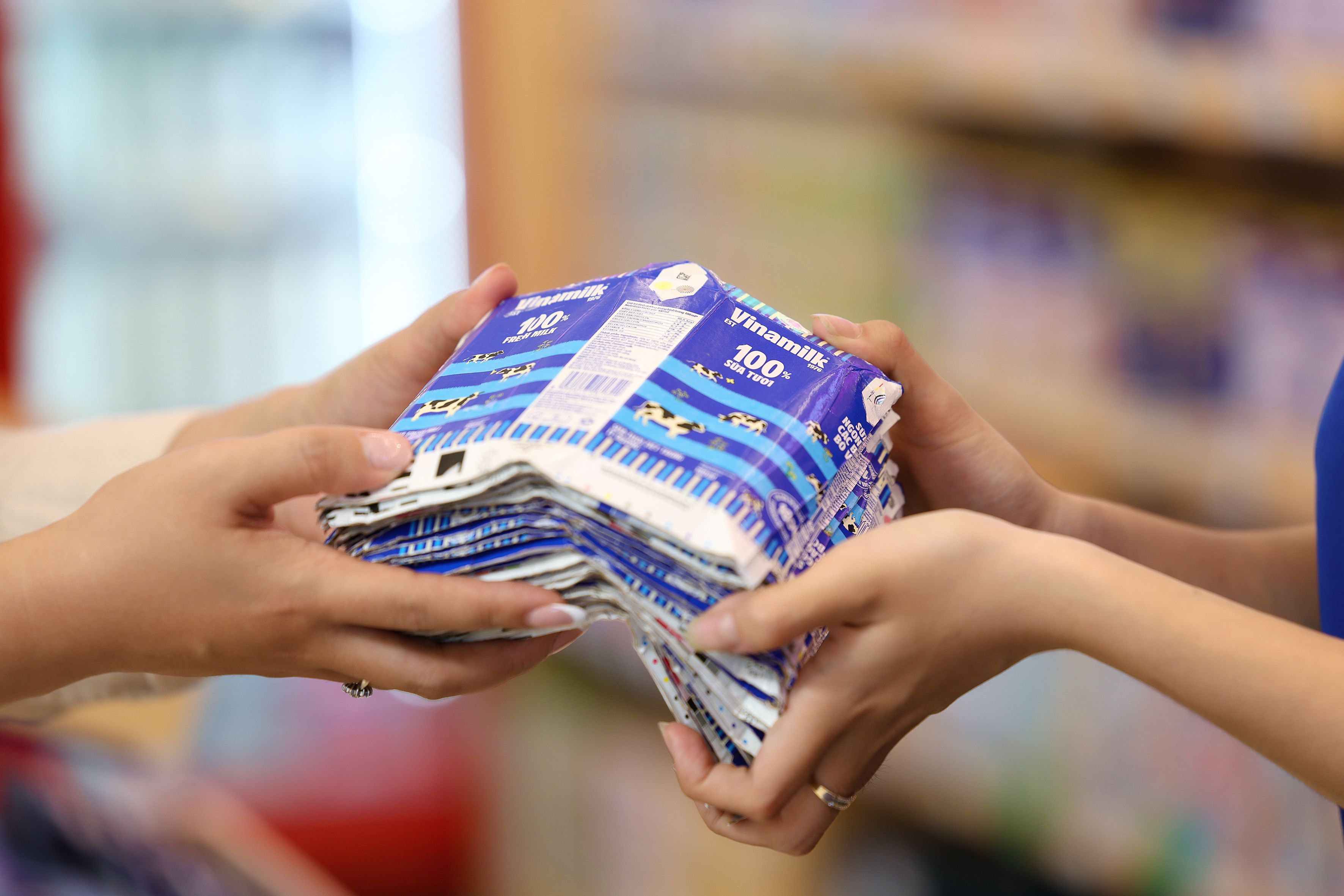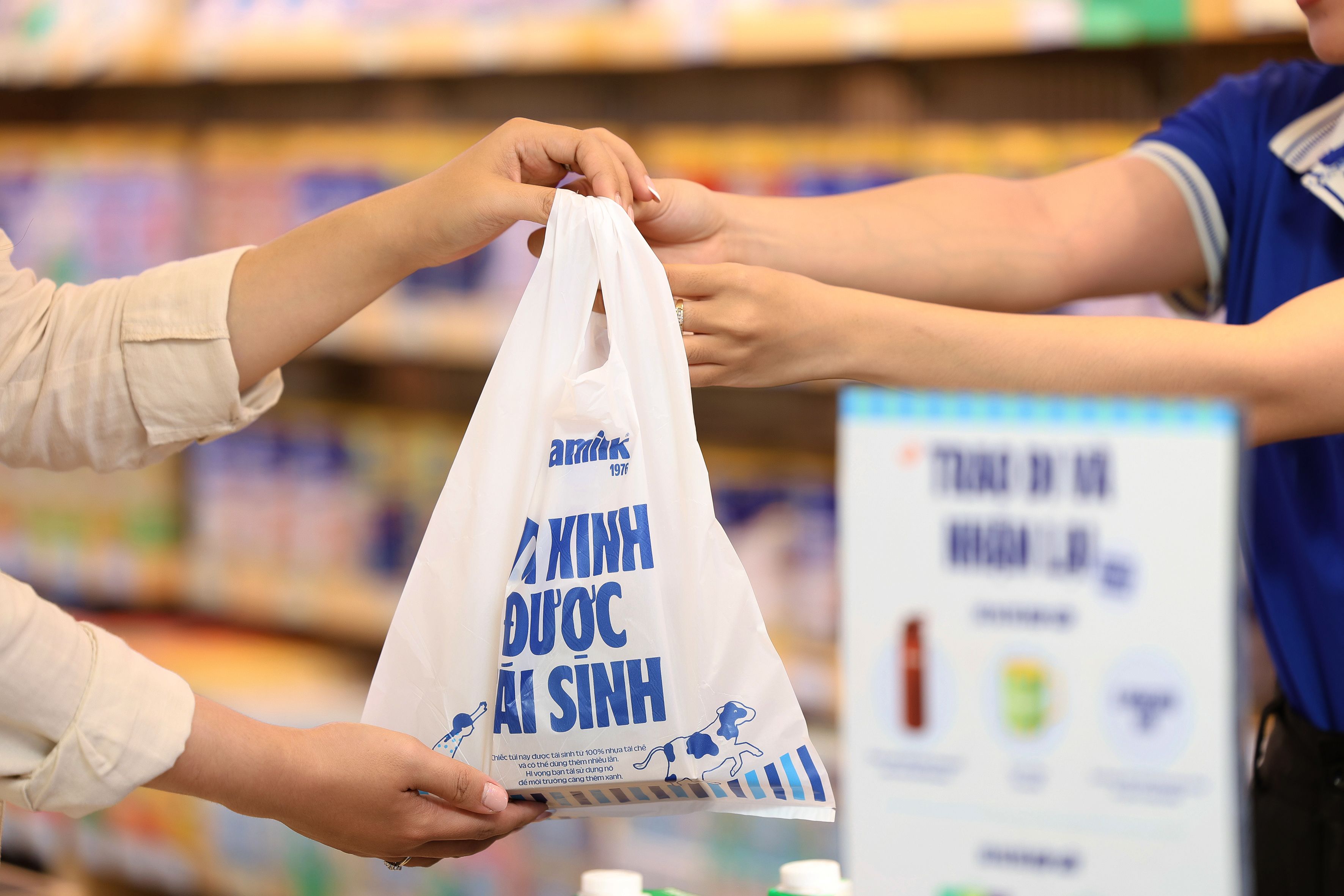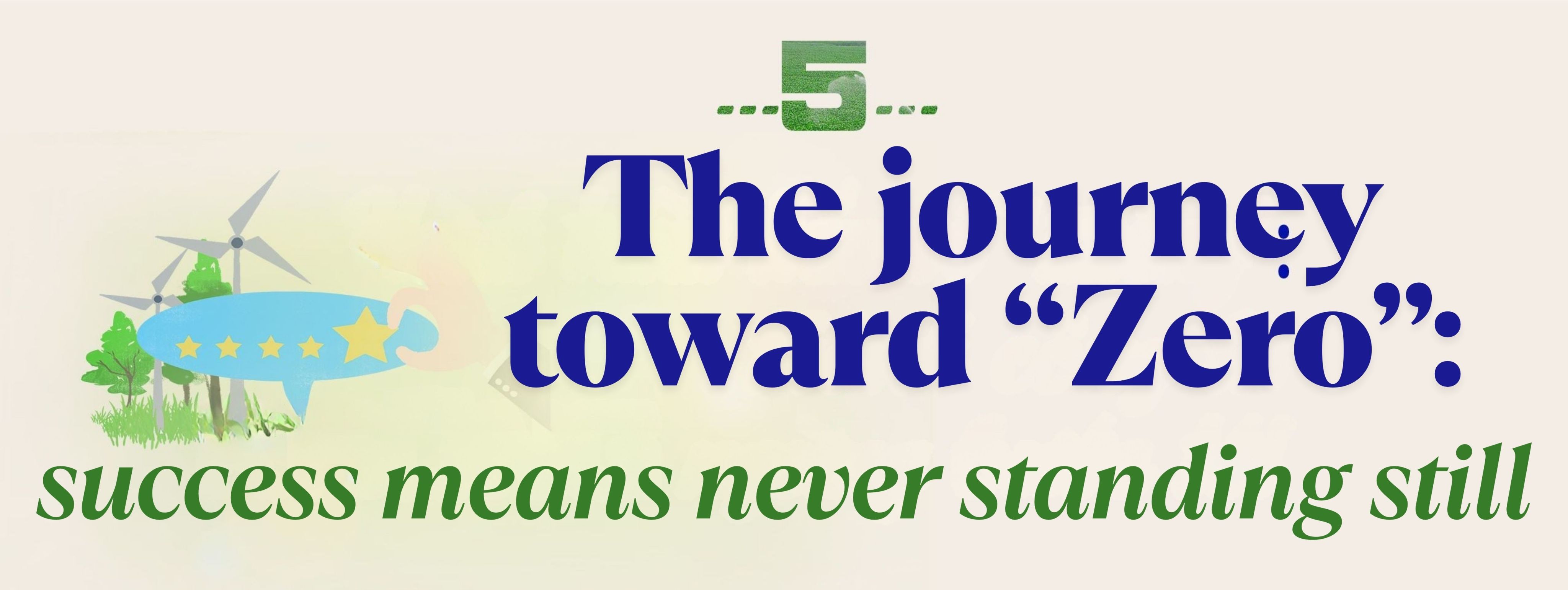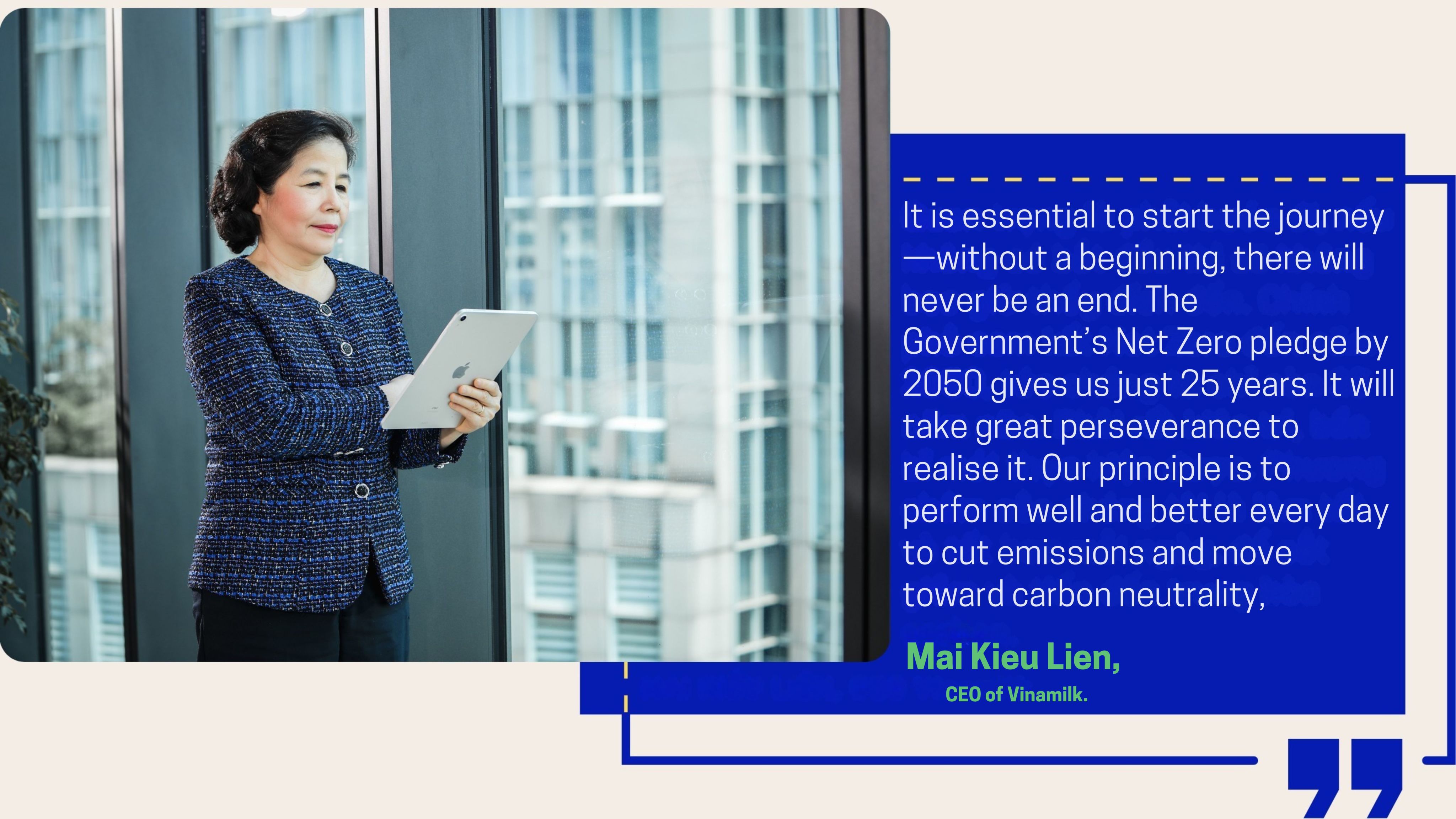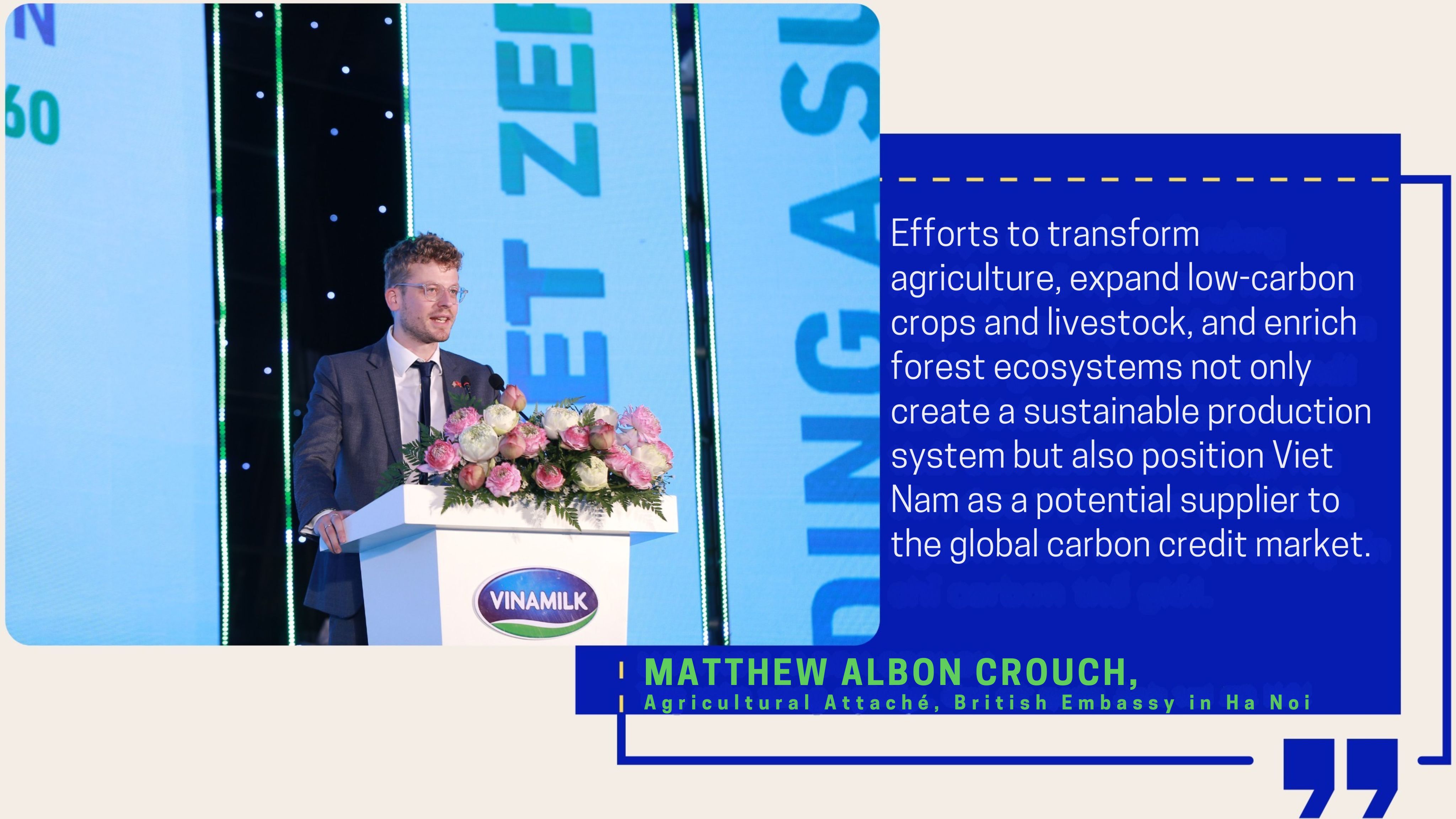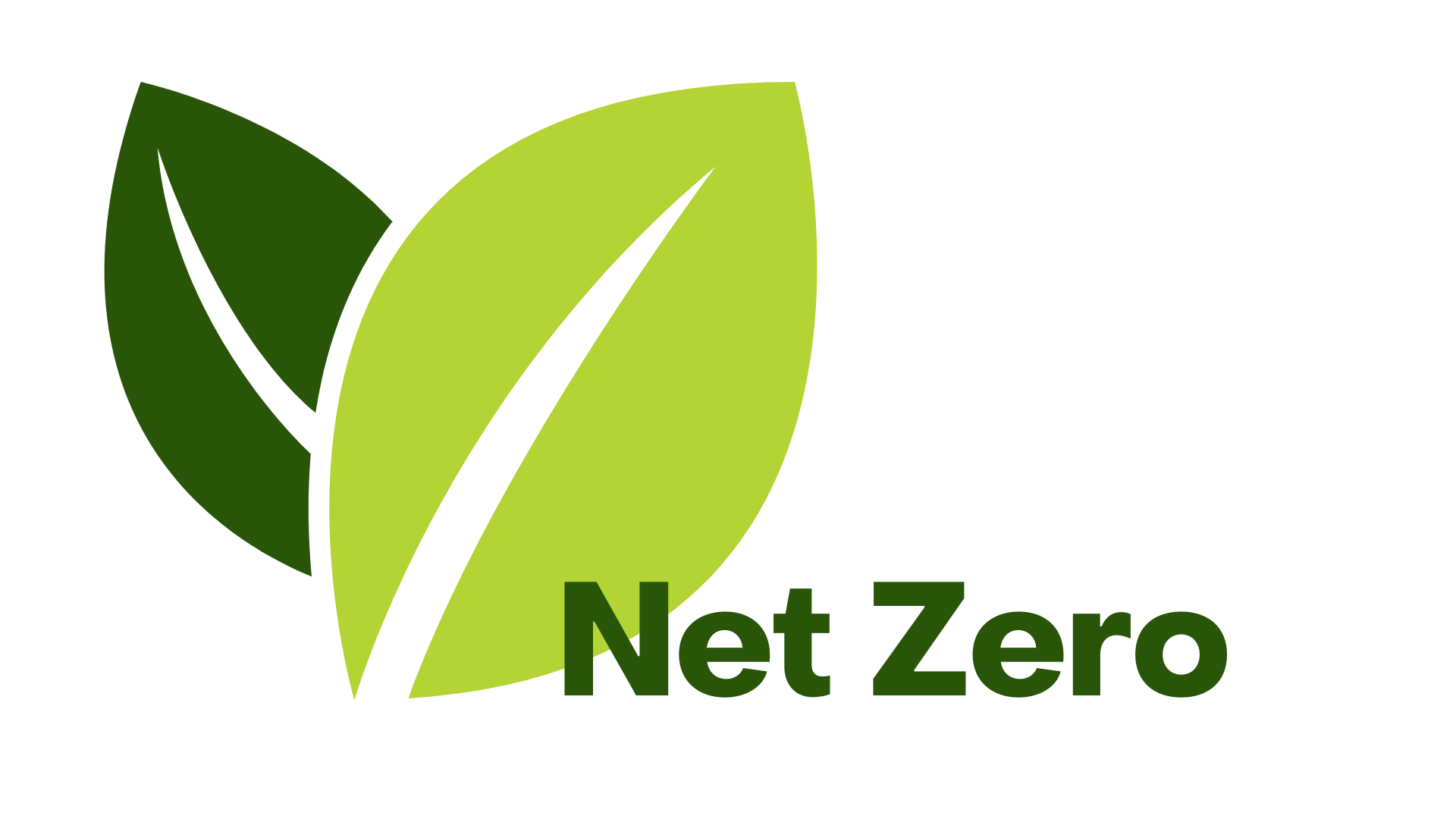
We were aware that Vinamilk as a pioneer in Net Zero, but when we started to learn deeper, we were truly surprised by their massive information warehouse on sustainable development. From international standard reports, in-depth discussions, and stories told by “insiders”, putting it all together we can outline Vinamilk’s Net Zero journey with 5 impressive “Nos”.
One early winter morning, we arrived in Yen Dinh, Thanh Hoa — the land where Thong Nhat farm was once famous. The car rolled through winding roads; on both sides were corn, grass, and pineapple fields stretching to the horizon. Tran Van Thuan, a son of Thanh Hoa, was leading us to a special stop, a place he proudly called a milestone that created a turning point for his hometown.
Pointing to the large rows of barns with solar-panel roofs among the green trees, Thuan slowly shared about the time in 2018 when Vinamilk invested more than 3 trillion VND to build the Thong Nhat Thanh Hoa Dairy Farm Complex, one of the largest and most modern projects in the country. Five years later, the complex was further invested in and developed according to the Vinamilk Green Farm ecological model, a typical example of sustainable agriculture applying the circular economy.
Thuan is currently the CEO of Thong Nhat Thanh Hoa Dairy Cow Company Limited, a subsidiary of Vinamilk. He has also spent decades working with Thong Nhat Thanh Hoa Farm and now Vinamilk Green Farm Thanh Hoa. He said that this area was previously mainly gravel soil, both poor in nutrients and unable to retain water, so people could only cultivate drought-loving plants such as pineapple, sugarcane, rubber, etc.
The appearance of a farm complex with an investment capital of trillions of VND from Vinamilk has brought a new look to this land. With more than 8,000 cows, the farm is not only a place that supplies about 100,000 litres of high-quality fresh milk every day, but also the nucleus to create a sustainable agricultural ecosystem where people and nature “join hands” in development.
Pursuing the principle of “nothing is discarded” in agriculture, all waste from the livestock process is collected and processed through the biogas system. Thanks to that, waste is converted into organic fertiliser to nourish the soil, and methane gas is recovered as energy to burn, serving the activities on the farm.
Cow barn
Manure treatment area
Dried manure
Corn field
Biogas-powered grass dryer
In addition to the farm’s 300 hectares organically cultivated field, the amount of fertiliser that meets the standards after treatment is also provided to hundreds of associated households, contributing to the improvement of more than 700 hectares of surrounding agricultural land. Thanks to that, the cool green colour of biomass corn — a plant that seemed impossible to grow in this arid land — now covers many fields, providing a sustainable source of livelihood for people who have been attached to the farm for many generations.
Not only in Thanh Hoa, the Green Farm ecological farm model has been invested in and developed by Vinamilk in Tay Ninh, Quang Ngai (according to Global SLP standards), and Da Lat (according to European Organic standards). The cycle that converts cow waste into agricultural resources has been synchronously applied across a network of 15 domestic and international farms, helping to reduce greenhouse gas emissions, limit the exploitation of natural resources, and control negative impacts on the environment.
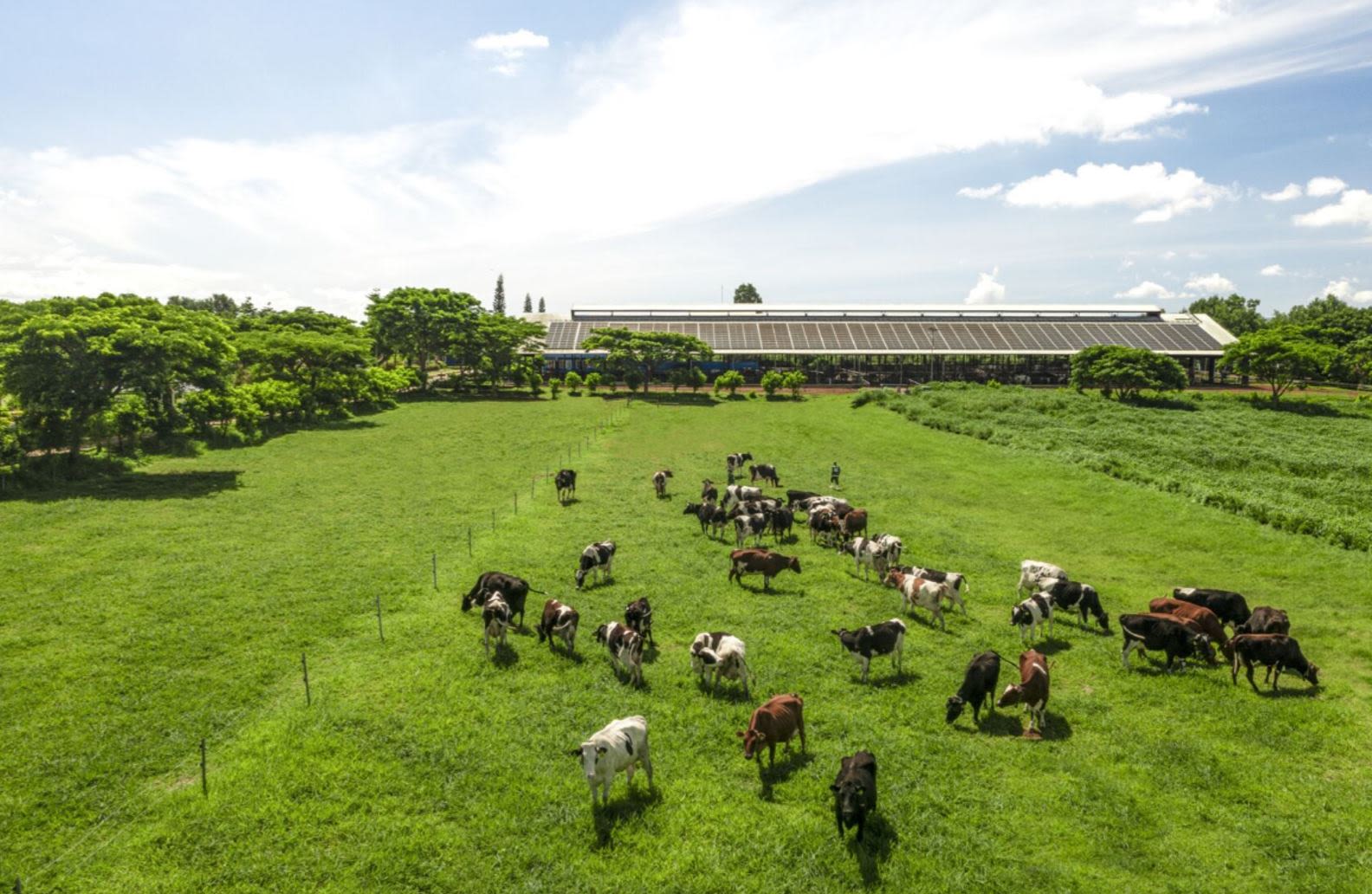
100% of farms meet Global S.L.P standards.
100% of farms use Biogas systems to convert waste into resources.
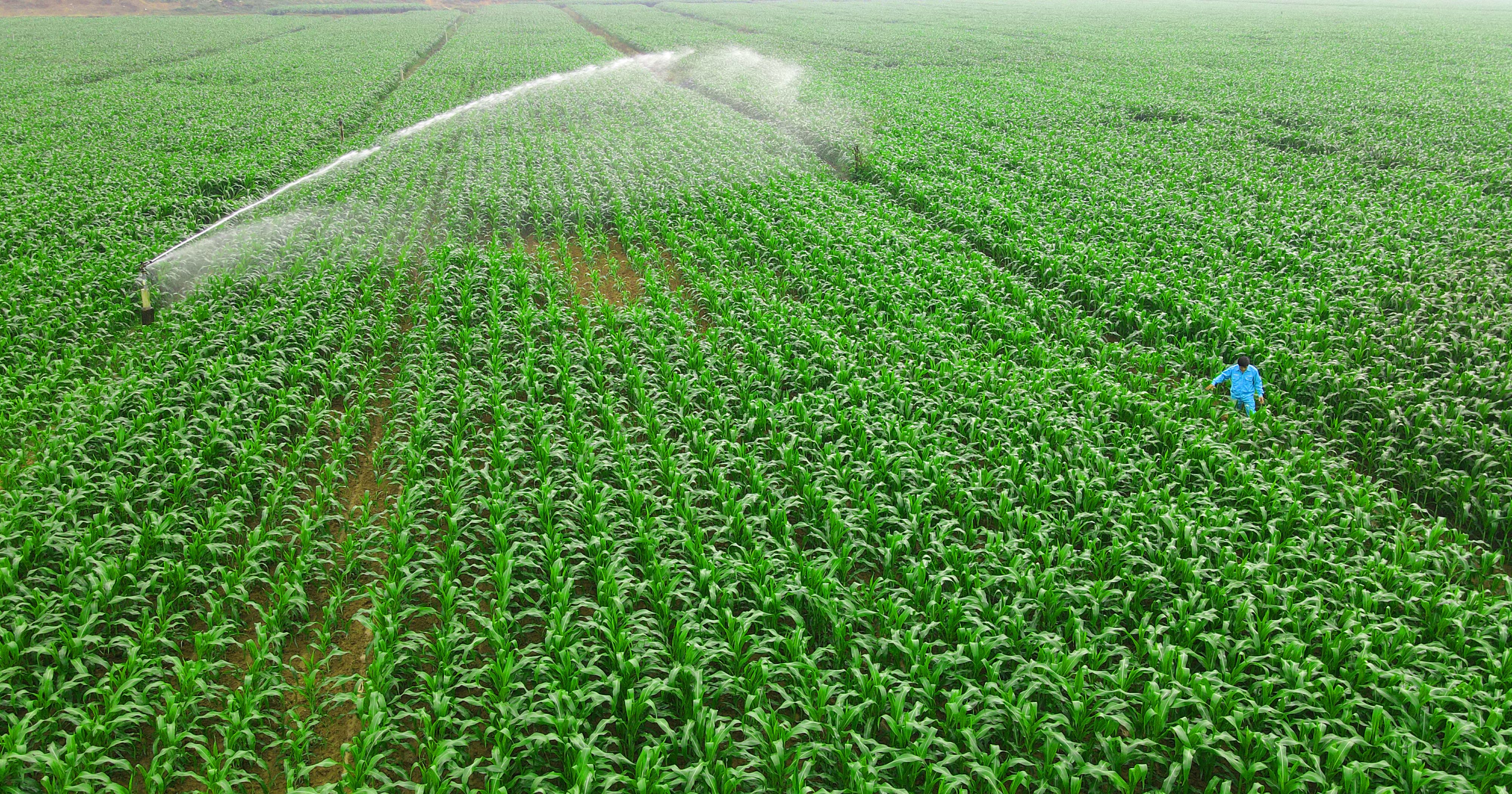
Water consumption at the farms stands at 17.8 m³ per tonne of product, down 11% compared to 2022.
85% of treated livestock wastewater meets standards and is recycled and reused for crop cultivation.
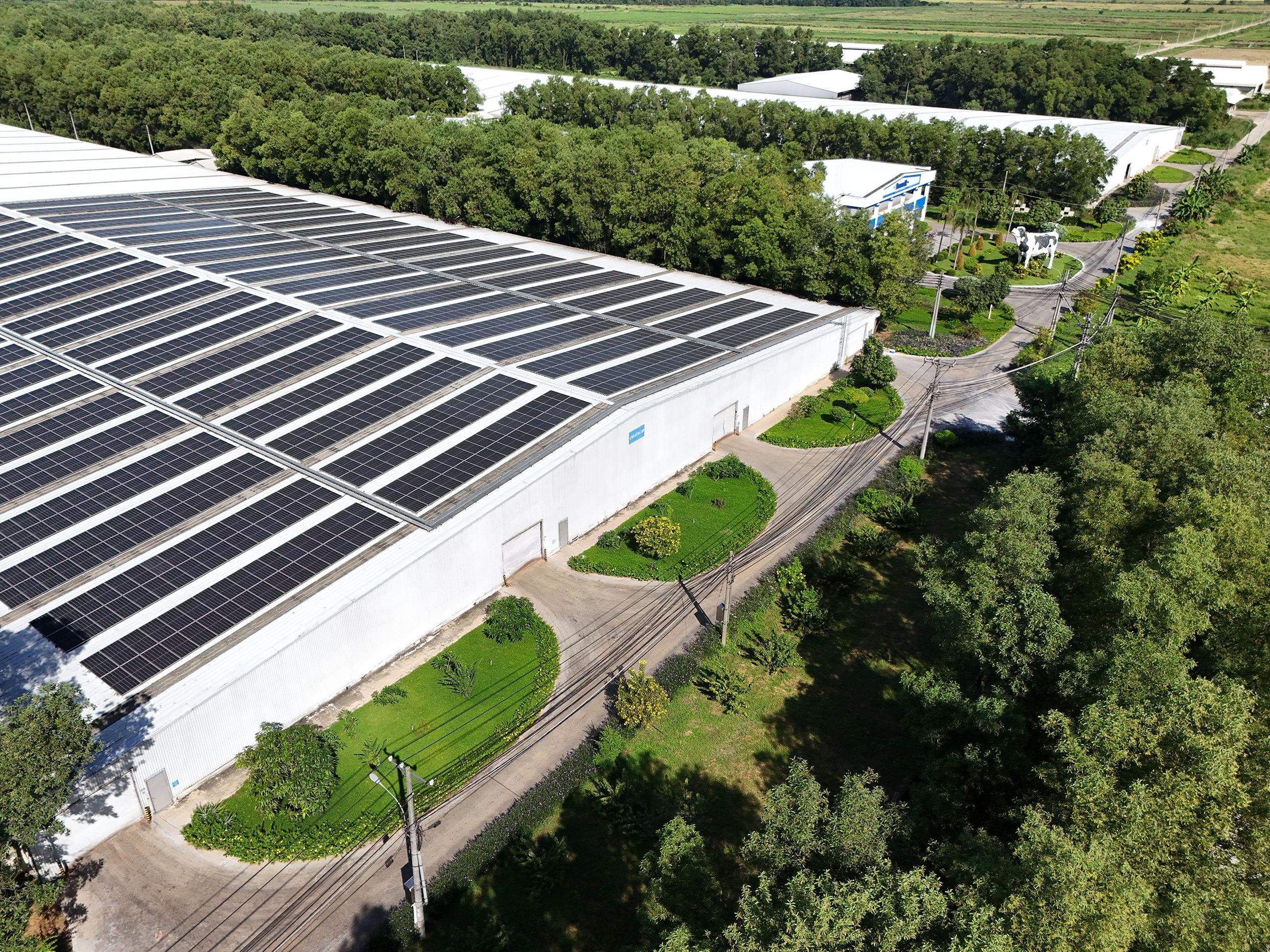
100% of farms use green and renewable energy
Leaving behind the Green Farm fields, where Vinamilk staff continue their efforts to produce organic, pure, and low-emission milk, we arrive at the Viet Nam Dairy Factory in Binh Duong. It is one of Vinamilk’s two mega factories and also one of the world’s most technologically advanced dairy plants, with a designed capacity of up to 800 million litres of milk per year. This output is equivalent to more than 12 million milk cartons (180ml) per day.
In contrast to its massive capacity, the factory operates with remarkably few workers. Alongside fully automated production lines, the most noticeable movement comes from the self-propelled LGV robots.
In 2023, Vinamilk became the first dairy enterprise in Viet Nam to have both its factory and farm certified as carbon neutral, including the Nghe An Dairy Factory and Nghe An Dairy Farm. Notably, the company achieved this under the internationally recognised PAS2060:2014 standard, with greenhouse gas inventories conducted in accordance with ISO14064.
In 2023, Vinamilk became the first dairy enterprise in Viet Nam to have both its factory and farm certified as carbon neutral, including the Nghe An Dairy Factory and Nghe An Dairy Farm. Notably, the company achieved this under the internationally recognised PAS2060:2014 standard, with greenhouse gas inventories conducted in accordance with ISO14064.
“This was a pioneering move by Vinamilk at a time when terms like ‘carbon neutrality’, ‘greenhouse gas inventory’, or ‘net zero’ were still vague concepts to most businesses. Becoming more than just a symbol of production capability, Vinamilk is gradually building a comprehensive ecosystem for sustainable development,” said Assoc. Prof. Dr. Tran Quang Trung, Chairman of the Viet Nam Dairy Association.
In contrast to its massive capacity, the factory operates with remarkably few workers. Alongside fully automated production lines, the most noticeable movement comes from the self-propelled laser-guided vehicle (LGV) robots.
Beyond optimising production processes and ensuring cost efficiency, the use of these robots has also helped to reduce CO₂ emissions by as much as 60% compared to conventional forklifts.
LGV robots handle the entire internal transport process within the factory, from delivering packaging materials and film rolls to moving finished products into storage.
LGV robots handle the entire internal transport process within the factory, from delivering packaging materials and film rolls to moving finished products into storage.
Following the pallets transported by LGV robots into the smart warehouse, we were truly impressed by the facility’s capacity of nearly 30,000 pallets, all managed entirely automatically by robots.
When goods are to be stored or retrieved, giant mechanical arms calculate pallet placement, identify barcodes, and transport product batches according to pre-programmed rules. The entire warehouse operation, although complex and requiring high precision, can be managed by just one person, while also saving 70% of the energy typically used by a conventional warehouse of the same size.
Operating a “smart warehouse” for more than a decade, Vinamilk stands among the first dairy enterprises in the region to have invested in this intelligent solution at its mega factories.
Operating a “smart warehouse” for more than a decade, Vinamilk stands among the first dairy enterprises in the region to have invested in this intelligent solution at its mega factories.
To date, the dairy giant operates four smart warehouses, including cold storage facilities, with a total capacity of nearly 50,000 pallets. These systems have helped reduce emissions by 1,898 tonnes of CO₂ per year — equivalent to the annual emissions of more than 400 cars.
The transition to green and renewable energy has also been a strategic move in Vinamilk’s roadmap to cut greenhouse gas emissions, implemented early on by the company. In 2024, it is estimated that nearly 90% of fossil fuel energy used in production was replaced by green energy sources such as solar power, compressed natural gas (CNG), and biomass.
In 2024, more Vinamilk units achieved Carbon Neutral status, including the Vietnam Beverage Factory and the Viet Nam Dairy Mega Factory — the company’s largest production facility. This achievement was not solely due to carbon “absorption” but mainly resulted from emission reductions within Vinamilk’s own production activities, covering both Scope 1 and Scope 2 emissions in accordance with international green manufacturing standards.
To “raise the bar” in the spirit of continuous improvement is one of the ten core values that define Vinamilk’s corporate culture. On its journey towards the Net Zero goal, this philosophy is evident in every step the company takes.
Le Hoang Minh, Vinamilk’s Net Zero Project Manager, cited the Viet Nam Dairy Factory as an example. This was the first facility in the company to pilot the Total Productive Maintenance (TPM) programme. Embodying the principle of “doing well and doing better every day”, the factory continuously enhances operational efficiency, boosts productivity, and optimises operating costs. In December 2023, the factory was evaluated by experts from the Japan Institute of Plant Maintenance (JIPM) and received the “Award for TPM Excellence, Category B”. Following this success, Vinamilk has expanded the TPM model to many of its 14 factories nationwide, amplifying its positive impact.
Adhering to the same principle of “raising the bar”, Vinamilk also leads the way in standardising activities such as greenhouse gas emissions measurement (ISO 14064), energy management (ISO 50001), and carbon neutrality certification (PAS 2060:2014).
In 2025, the international standard for carbon ceutrality, ISO 14068, will be issued to replace PAS 2060:2014, providing a more comprehensive and upgraded framework to help businesses implement their Net Zero pathways more effectively. “Vinamilk has been among the pioneers in adopting and completing this standard upgrade ahead of time,” Minh added.
Even in technology adoption, Viet Nam’s largest dairy enterprise continues to be a prime example of forward thinking. Beyond utilising state-of-the-art production technologies, Vinamilk has also applied artificial intelligence (AI) to analyse energy consumption levels for each product type according to packaging size. This initiative enables businesses to determine their exact energy consumption output, thereby gaining a clear picture of the factory’s overall energy use. It allows them to take specific actions to minimise unnecessary energy waste and enhance efficiency.
SCIENTIFIC ORIENTATION AND STANDARDISED PRACTICES
Vinamilk’s sustainable development practices and its journey toward Net Zero have always been designed and implemented in accordance with global standards, advanced sustainability frameworks, and international best practices in the dairy industry. In 2024, Vinamilk was once again honoured as the “Enterprise with the Best Greenhouse Gas Emission Management Report.” This marks the third consecutive year the company has received this award, recognising its tireless efforts to ensure environmental data transparency, measure and manage greenhouse gas emissions, and reaffirm its strong commitment to achieving Net Zero by 2050.
The biomass boiler system, which operates on renewable biofuel, has resulted in cleaner emissions.
The biomass boiler system, which operates on renewable biofuel, has resulted in cleaner emissions.
The biomass boiler system, which operates on renewable biofuel, has resulted in cleaner emissions.
The biomass boiler system, which operates on renewable biofuel, has resulted in cleaner emissions.
Vinamilk is not only pursuing internal “green transformation” but also proactively preparing carbon absorption projects and solutions to achieve net-zero emissions by 2050. Among its most notable initiatives are the “One Million Trees for Viet Nam” fund and the “Net Zero Forest,” both designed to create carbon sinks through tree planting and mangrove restoration.
From 2023 to 2029, Vinamilk is partnering in a natural regeneration project to restore 25 hectares of mangrove forest at Mui Ca Mau National Park. After more than two years of protection and rehabilitation, the project area has been rejuvenated with tens of thousands of young mangrove trees, each nearly a meter tall. It is projected to absorb the equivalent of between 62,000 and 73,000 tonnes of carbon dioxide upon completion. Previously, the “One Million Trees for Viet Nam” programme surpassed its original commitment by planting 1.12 million trees nationwide.
Beyond technological and managerial measures, Vinamilk’s sustainability journey is also powered by its people. Each employee is deeply conscious of emission reduction in every stage of production. Initiatives such as replacing plastic shrink film with mesh pallet wrapping, redesigning packaging to eliminate plastic straws, and reducing the number of plastic yogurt spoons have not only cut production costs but also significantly reduced plastic waste.
On the consumer side, Vinamilk demonstrates its sustainability commitment through 100% FSC-certified paper packaging sourced from sustainably managed forests, 99% of cartons printed with eco-friendly water-based ink, and the use of recycled plastic bags across all retail stores. Since mid-2024, Vinamilk’s carton collection and recycling programme in Ho Chi Minh City and Ha Noi has gathered 4.2 tonnes of used cartons within just six months. The programme has since expanded to five provinces and cities, with the establishment of more than 70 collection points.
|
|
|
|---|---|
|
|
|
The ultimate “Zero” for Vinamilk does not merely signify a practice or an initiative, it represents the spirit, determination, and pioneering mindset of a company advancing along a challenging path — one that only those with courage, resilience, and unwavering commitment can follow.
According to Mai Kieu Lien, CEO of Vinamilk, the global dairy industry is about 300 years old, while Viet Nam’s dairy sector has only developed for around 50 years. The concept of Net Zero remains relatively new to our industry. In its early days, Vinamilk explored and learned from how major global corporations reduced their emissions before adapting those lessons to Viet Nam’s realities—allowing the company to take “shortcuts” towards a more sustainable path.
According to the company’s leadership, Vinamilk became the first Vietnamese enterprise to join the global “Pathways to Dairy Net Zero” initiative in 2022 to affirm both the commitment and determination of Viet Nam’s dairy industry to this worldwide goal.
“It is essential to start the journey—without a beginning, there will never be an end. The Government’s Net Zero pledge by 2050 gives us just 25 years. It will take great perseverance to realise it. Our principle is to perform well and better every day to cut emissions and move toward carbon neutrality,” said Mai Kieu Lien, CEO of Vinamilk.
The “Iron Lady” of Viet Nam’s dairy industry—who spearheaded the nation’s “white revolution” more than 35 years ago—has continued to inspire businesses now embarking on the green transition. “I believe sustainable development carries no risks, only benefits. Alongside revenue growth, it brings environmental gains and enhances brand reputation—key to connecting with consumers. When your products benefit people and the planet, the value cannot be measured in money,” Lien emphasised.
Vinamilk’s pioneering role in sustainable development has been internationally recognised, ranking among the Top 5 most sustainable dairy brands globally (Brand Finance, 2023). Alex Haigh, Brand Finance’s Asia-Pacific representative, noted: “Vinamilk is pursuing Net Zero by 2050 and consistently leads in circular economy and regenerative agriculture models. Its stable business performance is clear evidence that sustainability efforts are paying off.”
“Moving toward Net Zero by 2050, progress in the agricultural sector—driven by pioneers like Vinamilk—will help Viet Nam reduce nearly 40% of its greenhouse gas emissions. The transition to low-carbon farming and ecosystem enrichment not only supports sustainable production but could also make Viet Nam a key supplier in the international carbon credit market,” said Matthew Albon Crouch, Agricultural Attaché at the British Embassy in Ha Noi.
Published: October 2025
Production Manager: Truong Son – Hong Van – Xuan Bach
Content : Thien Lam – Ngoc Bich
Translation: NDO
Design: Thien Lam - Ngoc Bich - NDO
